This is a guest contribution from Aviva Blumstein.
Relationship marketing. Influencer marketing. Buzzwords, for sure.
What do they mean?
I’ll give you the definitions that sound like they came out of the Marketing 101 textbook and then translate them to layman-speak.
What Is Relationship Marketing?
Relationship marketing: a form of marketing focusing on loyalty, retention and long-term relationships, designed around developing strong connections with customers by directly providing them with information that is tailored to their needs, wants and interests.
(definition by Gregory Ciotti at Helpscout)
Ted Rubin coined “relationships are the new currency” at SMWF in 2011.
He writes,
“Blasting out sales messages rather than listening and engaging has got to be the number one relationship killer of all time. Bar none.
People hate to be sold—especially on social channels, where their main objective is to talk, get opinions, relax and have fun, or find answers to pressing problems.
When a brand spends the majority of its time broadcasting, it’s a clear message to followers that they’re not interested in real, two-way communication.
Listening should be your first priority, followed by engagement. Don’t try to sell to people until you’ve earned their trust!”
One minute.
Let’s look at that again.
“When a brand spends the majority of its time broadcasting, it’s a clear message to followers that they’re not interested in real, two-way communication… Don’t try to sell to people until you’ve earned their trust!”
So… you should shut your mouth and not try to push sales because otherwise people will think you’re not interested in real communication.
Instead, you should do lots of listening, earn their trust, and THEN sell to them.
That’s what it said, right?
Let me propose another definition of relationship marketing. Short and sweet.
RELATIONSHIP MARKETING = let me be your friend for as long as it takes me to sell you something.
And if I think I might be able to get multiple sales out of you, or you need to keep renewing my service, I guess I’ll keep being your friend.
What Is Influencer Marketing?
Influencer marketing is basically rented relationship marketing.
You find someone who has a relationship with your target audience and try to get them to promote your content or products.
Content marketer Barry Feldman defined influencer marketing as
“the fine art of getting big kahunas in your camp. To achieve greater reach and resonance (ooh, fancy marketing words), you try to win over the people who already have it. And it can be amazingly effective.”
How do you win over those big kahunas? You share their stuff, you comment on their blogs, you link to their content in your blog posts… whatever it takes.
So let’s propose our definition of influencer marketing:
INFLUENCER MARKETING = let me suck up to you for as long as it takes for you to notice me and share my stuff.
In a way, old-style marketing was more honest. At least it was clear that they were in it for themselves.
Say it ain’t true?
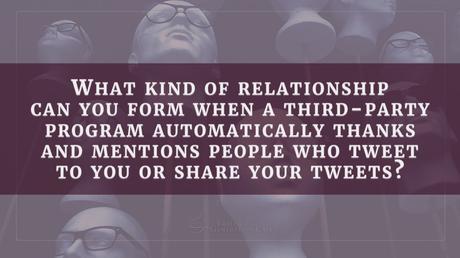
Like this one:

Sometimes it is painfully obvious that it’s automated.
Or this one:
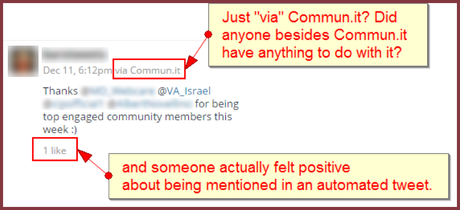
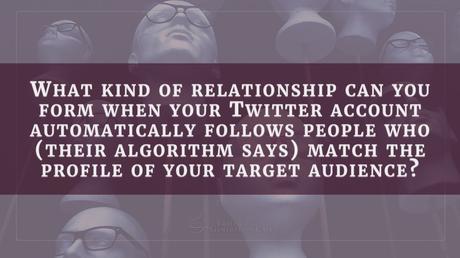
And then if they follow you back, your account sends an automated direct message or welcome tweet?
And if you don’t follow them back, the artificial intelligence apparently becomes insulted and unfollows you. I guess they were really interested in what you had to say, huh?
True, I don’t know that all people who are following me are doing that – but I get rather suspicious when:
1. I send them a tweet (manually, not automated), saying thanks for the follow and including some piece of info that I like about their site so they’ll KNOW it’s not automated. And then I get no response.

Yep, no response to these. They wanted to follow me, but apparently they didn’t want to actually communicate with me.
A shame they didn’t have Commun.it. Then at least an algorithm might have noticed my attempts to communicate and told me I was a top engaged community member…
2. I get notified that someone followed me about 10 hours ago, go to their profile to check them out and see if I want to follow them back and… guess what? They’re no longer following me!
Hmm… did they click Follow by mistake and then suddenly realize I wasn’t who they thought I was?
Or did their automated follow program only give me 5 hours to follow back before they assumed I wouldn’t return the favor, and so they unfollowed me?
That’s not a lot of dedication to your “relationships.”
More on ‘the other side’ of automation coin:
Social Media Automation: A Little Less Conversation, a Little More Action – Jonathan Crossfield talks automation with Jeff Bullas at contentmarketinginstitute.com
Why You Should Get Serious About Social Media Automation – Jeff Bullas himself at jeffbullas.com
Also, here’s an interesting Twitter ‘faceoff’ – between Ana Hoffman and Nicholas Cardot:
Nick Cardot vs Ana Hoffman Twitter Faceoff: Quantity Trumps Quality – Ana Hoffman at Nick Cardot’s sitesketch101.com
Ana Hoffman vs Nick Cardot Twitter Faceoff: Quality Trumps Quantity – Nick Cardot at TrafficGenerationCafe.com
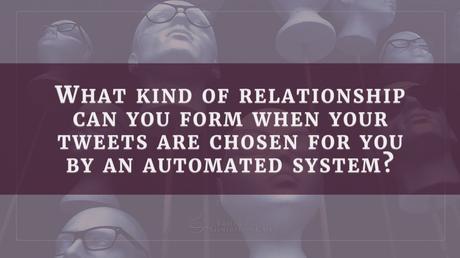
I recently signed out of Hootsuite and was offered the chance to have even less input into my social media accounts:

See?
Now I can have my automated system spit out tweets you’ll like – and your automated system can retweet them, and then my other automated system will thank you.
And neither of us have to be involved!
This is the stuff which deep relationships are made of…
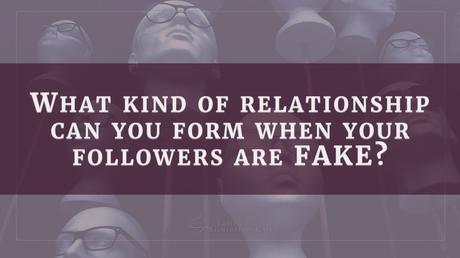
Not even real people using automated systems.
Fake. Made-up. Imaginary. Only exists as a figment of the imagination in the mind of some marketer or marketing program somewhere.
Recently we got a record number of likes on a tweet of ours.
I was excited – and a little suspicious. (I’m jaded, I know.)
So I decided to click on the list of likers. Mm-hm.
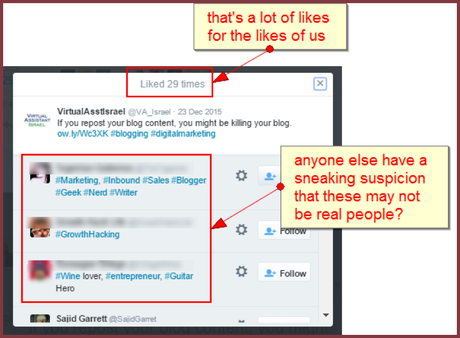
And sometimes it’s even harder to tell.
Whenever I get followed, I usually check their profile before deciding whether or not to follow them back.
Two months ago, when I went to check out a new follower, I was impressed with the following-followers ratio:

But I wasn’t as impressed with the tweet stream. Just a lot of tweets of digital marketing related posts. No conversations.
So I didn’t follow him.
Around the same time, I kept seeing a certain profile come up in the “suggested people to follow” section.
I finally went to check it out. Good photo, nice header, good bio something along the lines of “Helping businesses succeed. Digital #marketing leader. Father. Believer in God.”
The website link made me raise my eyebrows though. It was hosted on a free blogging platform – johndoe.weebly.com or johndoe.wordpress.com or the like.
Strange. You’d kind of expect a professed marketing leader to have his own website.
But the tweet stream made me stop short. It looked exactly the same as the other profile. Lots of digital marketing content tweets. All beginning with a number (17 Ways… 12 Things… etc.). The same unusual URL shortener.
And… as I scrolled down the tweet stream, I noticed that the posts actually repeated themselves.
Except they changed their numbers.
Yep.
17 Ways to Supercharge Your Facebook Marketing in December 14 tweet became 16 Ways to Supercharge Your Facebook Marketing in December 7 tweet. Which became 15 Ways to Supercharge Your Facebook Marketing on December 1.
I kid you not.
And every single tweet was part of this pattern.
Now I simply had to check out the website.
It was a standard free blogging platform template, with marketing articles. Anonymous, filler marketing articles. No about page. No hint of who was behind this site.
That was only the beginning. Over the next two weeks, I was followed by/suggested several other accounts of purported digital marketers who, upon account inspection, matched the same criteria.
- Real sounding names and profiles.
- Good photos.
- Follower/following counts looked believable and in some cases even “influencer-worthy.”
BUT
- The profile link was a filler site on a free blogging platform.
- The tweets were all curated posts, many of them with the same “rotate the posts with different numbers” strategy mentioned earlier.
Only one of the accounts actually had a real site with [hisnamehere].com. It looked a little outdated, like no one had touched the design for the last decade, but still – it was real!
‘Was he the mastermind behind all these fake accounts?’, I wondered.
Since I’m not a Twitter vigilante, I decided not to pursue the matter, and just copy the accounts into a Google Spreadsheet, should I ever decide to write a post about this.
Well here I am.
And while I would love to have shown you screenshots of the “rotate the posts with different numbers” game – or a screenshot of the real-sounding profiles, I can’t.
Because when I opened up the Twitter profile page for the first account on my list, I did a double take.
Joe Schmo, the marketing leader, had abandoned digital marketing in favor of promoting persian bridal gowns.

Here’s his new Twitter header.

Well, now.
I checked every one of the other 5 accounts I had pegged as “fake.” The exact same bio. The exact same header. Not even an attempt to vary it, like when they were all “digital marketers.”

On a whim, I took one of the head shots and searched it in Google Image Search (this inspired by Issamar Ginsburg’s article on how he looked into an alternative medicine provider his client wanted to do business with – only to find out that her photo was a stock photo and was used across the web for other “professional profiles”).
The photo returned 27 results in Google search. About 20 of them were varied Twitter profiles. Are we thinking a stock photo?
It got worse. The last few results were profile shots of a professor at the University of Wisconsin – Madison. She shows up several times in their online Experts Guide, as she’s a professor of landscape architecture and an environmental specialist.
Dearie me. Oh, dearie, dearie me.
I scrolled back the tweet stream in one of the Twitter accounts to try and find some of the old marketing tweets. They appeared around January 1st, interspersed with the bridal tweets. As you go farther back, the bridal tweets disappear. Marketing only.
I guess our marketing leader decided that marketing is all a bunch of lies and made it a New Year’s resolution to change professions. He should be an example to us all at keeping our resolutions.
But he had help, you see. Because while scrolling backward through the stream I came across this tweet:
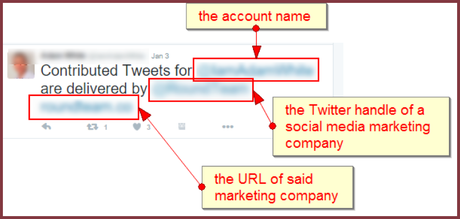
Mm-hm.
How many Twitter accounts does this company operate? How many people follow these accounts – assuming they’re following real people? How many people who had followed marketing leaders got blasted with bridal tweets?
By the time this blog post is published, our adventurous marketing leaders, er – bridal dress experts, may have undergone another career pivot. You see, I’m writing these words on January 13. The Persian Bridal Show is on January 17. They’ll probably be bored afterwards.
Relationship Marketing Food for Thought
You know what?
I didn’t intend to write this as an expose. When I started writing it, I had no idea how bad things were going to get. And I still don’t intend it to be an expose. That’s why I blurred out identifying information in the screenshots above.
Because that’s not the point.
The point is not to aim an unforgiving spotlight at some *other* marketers. It’s to aim one at ourselves and take a good look.
I’m not saying that social media can’t be used for building relationships.
Most of us can testify to deep, true relationships that we never would have had if not for Facebook, Twitter, and the like.
I’m also not saying social media shouldn’t be used for business and marketing.
It’s a great medium with high potential for targeting and reaching the right audience.
It’s when the two get confused that I wonder where humanity is heading.
When someone gets a follow from you on Twitter, should they feel flattered? Or should they feel used?
If we start to see “relationships as the new currency” – are we focused on the person on the other side of the relationship? Or only on what our “relationship” will buy us?
I’d love to hear some intellectually honest discussion about this in the comments.
Let me share one idea that I’ve been mulling over, to start off the discussion.
I’m into classic Jewish philosophy. This topic is discussed a lot. (Without mentioning Twitter and marketing, obviously. We’re talking philosophers, not prophets.)
It’s the concept of doing outwardly positive acts for ulterior motives. Is that a good thing or not a good thing?
The classic sources say conflicting things.
On the one hand, there are statements like “If you do it for the wrong reasons, you’ll come to do it for the right reasons.”
On the other, there are statements like, “Anyone who does it for the wrong reasons, it would be better if he hadn’t been born.” (A little strong, right?)
One way to resolve the conflict is to determine the ultimate motivation behind your action.
Do you want to be able to do the right things for the right reasons? Is your eye on the goal even though right now you need a little ulterior motive to push you in the right direction? Okay; then you’ll get there – eventually.
But if you’re content with your motives and really see no reason to ever change them, you’re doomed.
If you’re a “relationship marketer”, be honest with yourself.
What do you really want the end to be?
Do you really want an ongoing relationship with this person you’re targeting?
Would you be happy fostering a relationship with them, giving to them (whether it’s help, information or an ego stroke) even if you knew it would NEVER EVER lead to any profit?
If that’s your goal (even if right now you kind of have to make a living, so you don’t have too much time to devote to non-profit-generating relationships), then go forth. Your relationships will end up being real relationships, even if the impetus was marketing.
But if these relationships are just another tool on the way to a sale, and otherwise you would dump 9/10 of your followers and fans in an instant… that’s about as much of a relationship as early 20th century sweatshop owners had with their “employees.”
Do we really think we can have our relationships and eat them too?
Would love to hear from you.
Aviva Blumstein
Aviva Blumstein would someday like to be your friend, but now she just wants you to hire her company’s virtual assistants. You can create a relationship with her logo by following her on Twitter, checking out the Virtual Assistant Israel site, or sending her an honest-to-goodness email [aviva AT virtualassistantisrael DOT com] that she’ll actually read, appreciate, and respond to – herself.
(Insulted? Wait, wait! Did you read the article above?  )
)

